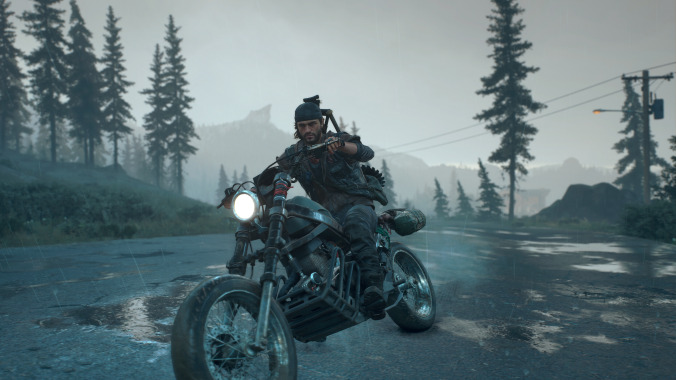Days Gone is the Red Dead Redemption 2 of biker zombie games, for better or worse


Every Friday, several A.V. Club staffers kick off our weekly open thread for the discussion of gaming plans and recent gaming glories, but of course, the real action is down in the comments, where we invite you to answer our eternal question: What Are You Playing This Weekend?
I never got a chance to say my piece on Red Dead Redemption 2 back when it came out, so allow me to indulge myself: That game is incredible. It improved upon every aspect of the previous entry in the series in such a masterful way that it retroactively made the original’s already-excellent story deeper and more meaningful. Also, there’s a sequence near the end that briefly flirts with becoming a proper rhythm game, and it’s so audacious and silly that only a supremely confident studio like Rockstar could have pulled it off in a game that is primarily about one man’s extremely slow and extremely tragic death. I loved every second of it.
That being said, the actual gameplay of Red Dead Redemption 2 was very methodical, with every single action requiring an occasionally unnecessarily long animation. For example, using a horse requires keeping it happy, which also requires keeping it healthy. One way you do that is by regularly brushing it, but rather than just hitting the “brush” button, you have to walk up to your horse, hold down the brush button for a second, and then watch as playable character Arthur Morgan methodically cleans the horse’s hair and gives it a little pat. Imagine that same level of specificity applied to literally everything in the whole game, whether you’re in a gunfight (hopefully your guns are clean!), refilling your health with a quick meal (hopefully you’ve made a fire so you can cook that meal!), or just walking through camp (hopefully you’re not covered in blood and dirt!). This, unsurprisingly, was the unifying complaint in every Red Dead Redemption 2 review that wasn’t glowingly positive, and even as someone who loved the way this grounded you in the character’s shoes, I do think it’s a very understandable criticism.
This, surprisingly, is where Days Gone comes in. In a bizarre twist, Sony’s new biker zombie game has perfectly captured the exact same style of slow and purposeful gameplay that was universally regarded as the worst thing about Red Dead Redemption 2—which, again, is a very good game that I love everything about. I do not love everything about Days Gone, though I am, admittedly, fewer than a dozen hours into it. Red Dead Redemption 2’s setting and tone lent itself to the slow approach, since Arthur had a world-weariness that made him take on a lot of the missions begrudgingly. Whereas Days Gone is a game where you’re supposed to be constantly and eagerly on the move. In a way, your character—an outlaw biker named Deacon St. John—is more like Red Dead’s unhinged gang boss Dutch Van Der Linde than Arthur Morgan, since he has a bad habit of coming up with self-serving plans and making promises that he might not be able to keep.
But let’s back up: Days Gone is an open-world zombie game, set in the post-apocalyptic wilderness of the western United States. Deacon is what’s called a Drifter, a mercenary of sorts who floats from camp to camp, doing odd jobs for other survivors and killing bad survivors (another good name for his job would be “video game character”). Your motorcycle takes the place of Red Dead’s horse, the one lifeline you have in a dangerous world, and a constant concern that requires your attention a little more often than it should. You have to keep it filled with gas (requiring you to find a gas can and refill the tank by holding a button and watching an animation) and keep the engine running when you hit a tree or an enemy (requiring you to have generic “scrap” on hand and fix the bike by… holding a button and watching an animation). Also, if the bike gets knocked over, as it probably will when you’re getting swarmed by enemies, you have to manually pick it up (by, get this, holding a button and watching an animation).
Speaking of enemies, there are a few different types in Days Gone: Evil survivors—some of which hide in trees and carry sniper rifles and are total cheap-ass bullshit—and the zombies, or, sorry, the “Freakers” (nobody’s using the zed-word here). Fighting humans is pretty much just like every other game, but the Freakers are the main stars. They’re typically dumb enough that it’s fun to dodge them as though this was a Resident Evil game, but that’s only possible when they don’t group up and move in big, threatening swarms. That’s one of the only meaningful hooks in a zombie enemy’s arsenal, and to Days Gone’s credit, running from a massive horde of Freakers on a motorcycle as they scream and fall over each other is surprisingly effective and terrifying in a way that the Freakers normally never are.
The brilliance of Red Dead Redemption 2 wasn’t really clear until its epilogue, and while I’m far from reaching the end of Days Gone, it’s clear that it’s reaching toward its own tragic ending—zombie stories don’t often have happy conclusions, after all. I don’t know if the game will be able to pull it off, but there’s enough interesting things here that I’m curious to see how it works out. Who knows: Maybe Bend Studio will have somehow managed to outdo Rockstar, and I’ll be ready to say that I like everything about Days Gone once I’ve spent 100 hours scooting around the wilderness and bopping Freakers with a baseball bat. That doesn’t seem super likely, given what I’ve played, but I’m open to the idea.